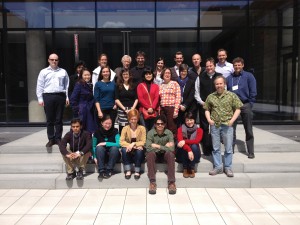Last week, I attended the Global Political Economy (GPE) PhD Dissertation Workshop held at the Balsillie School of International Affairs (BSIA) in Waterloo, Canada. I was very curious to learn how the Canadian field of political economy would differ from the one here in the U.S. Established by the Canadian entrepreneur and founder of Blackberry, Jim Balsillie, the school was a very new institution with cross-teaching faculty from the University of Waterloo and Wilfried Laurier University in Canada. Waterloo is almost a two-hour drive from the Toronto Pearson International Airport, and I would say the area is not so urban, but the logistics and organization of the workshop was done in such a way that participants would suffer less while traveling. My host family (Jennifer Jones at the BSIA and her family) were very accommodating, and would sit with me and talk to learn about my work, life in South Korea and the U.S., and how we are doing in the workshop.
I also liked the fact that although scheduled pretty tight, the two-day format of the workshop was efficient in many respects benefitting from the ‘comments only’ sessions, without the actual presentation of papers. I have been to another dissertation workshop which involved presentations and comments, and in those settings it took a whole week to finish. I think this BSIA GPE workshop format really works.
I was very glad to have benefitted from this workshop due to several reasons. Although the workshop was quite interdisciplinary within the IPE spectrum, I received a lot of good comments on my draft from established scholars of my field (e.g., Herman Schwartz, Eric Helleiner, Hongying Wang, just to name a few) that specifically dealt with how to make the chapter and the dissertation as a whole go forward. In many bigger conferences, usually the focus is on criticizing the faults of the draft, but this positive feedback from the workshop solely focused on the paper (and not the person) was a revitalizing energy for me. I have no doubt that this was the case for many doctoral students in the workshop. I also reunited with my buddies from fieldwork in China, Pacale Massot at the University of British Columbia. It was really great to catch up and discuss our progress.

With the Global Political Economy PhD Dissertation Workshop participants at the Balsillie School of International Affairs, Waterloo, Ontario, Canada (April 24-27, 2013)
On the personal, I must say that I had been so focused on applying to jobs and slightly demoralized by getting continuous rejections that I was starting to lose faith in my project, and I was able to overcome the crisis by attending this workshop and receiving very good feedback. Another PhD candidate on the market, Julian Germann, introduced my paper and put wings on my project. Networking and building friendships with other people in the workshop also made me feel comfortable in the field of IPE. The atmosphere was very collegial and positive, as opposed to many other academic venues I have been to in the U.S. In the workshop, we generally discussed the papers as third objects without having to directly attack the person for his or her arguments or methodology. I think it is something that the U.S. academia needs to learn and pick up from the Canadian academia.
